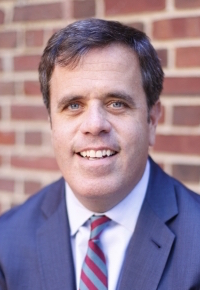Fathers Forum 2017: You Asked, They Answered
By John Lloyd
 What would happen if you put an engaging group of experts in front of a crowd of engaged fathers and let the audience drive the conversation? The 8th annual PIA Fathers Forum set out to answer that question. It worked. The session went 45 minutes longer than scheduled, to handle the volume of questions; and even as it ended, dozens of fathers lined up to continue the discussion with panel members one-on-one. The evening provided a judgment-free environment where fathers could talk openly about their struggles.
What would happen if you put an engaging group of experts in front of a crowd of engaged fathers and let the audience drive the conversation? The 8th annual PIA Fathers Forum set out to answer that question. It worked. The session went 45 minutes longer than scheduled, to handle the volume of questions; and even as it ended, dozens of fathers lined up to continue the discussion with panel members one-on-one. The evening provided a judgment-free environment where fathers could talk openly about their struggles.
This year’s PIA Fathers Forum was held on March 7th at the Trevor Day Upper School. Roughly 150 dads, representing 40 different schools, heard from an impressive panel of educators and experts, all fathers themselves.
Moderator Bill DeHaven, Head of School, Winston Preparatory School, was joined by panelists Paul Burke, Head of School at The Nightingale-Bamford School; Joshua Mandel, Doctor of Psychology, Director of Psychological Services at Collegiate School; and Jerry Bubrick, PhD, Senior Director, Anxiety and Mood Disorders Center and Director OCD Service, Child Mind Institute.
In a departure from previous Forums organized around a single topic, this evening’s focus was questions from the audience, which covered a wide range of topics:
The role of fathers
A number of questions noted the changing role of fathers. Bill said that fathers have an image problem, as mothers are traditionally seen as the nurturers and caregivers. It’s time for dads to stand up, he added, as the presence of fathers in children’s lives is so impactful.
Both boys and girls learn about maleness from the male adults around them, Josh said. Men who were themselves taught to suppress their emotions have to guard against slipping back into stereotypical fathering – i.e. exerting control. This just extends this same problem to another generation.
When a father and his child have a close relationship, research shows the child will be better off not just early on but for rest of his or her life. The list of benefits is long and broad:
- Higher tolerance for frustration and stress
- Increased openness to trying new things and connecting with others
- Improved emotional health, empathy, and self-control
- Resistance to gender-stereotypical attitudes
Josh works at an all-boys school, and he has seen that boys who have a close relationship with their fathers handle ups and downs more smoothly. Paul works at an all-girls school and stressed that daughters look to fathers for guidance on how men should treat women, including noting how they treat the child’s mother.
Family conflict
 A number of questions focused on sources of family conflict, including parent-child conflict and issues between parents themselves.
A number of questions focused on sources of family conflict, including parent-child conflict and issues between parents themselves.
If your child seems to go out of his or her way to challenge you – “You can’t make me!” – Jerry suggested ways to interrupt that dynamic:
- Keep your own emotions in check (kids won’t respond reasonably to negativity)
- Focus on effecting a change rather than trying to “win”
- Discuss with your spouse – in private and away from the child – strategies for defusing these situations
It’s okay if you and your partner have different approaches to parenting, Josh said. Kids need to understand that mom and dad don’t agree on everything. Recent research shows the benefits of children being exposed to two differing approaches to parenting.
Be careful, however, not to show a lack of respect for your partner in front of kids, Jerry stressed. Instead, model how you want your children to react. Are you teaching them that someone’s right and someone’s wrong, or are you teaching them compromise? A top indicator of a child’s success in school is how his or her parents treat each other.
For fathers dealing with the impact of a divorce on the child: if they are resistant to engaging with you, consider letting them design the time you spend together. That might mean just playing a video game side by side. As Bill said, “We can’t not have a place in our kids’ lives, no matter what.”
Body image
Jerry reminded the audience that it’s normal for both girls and boys to be nervous about how their bodies are perceived. He advised being watchful for signs of excess: restrictions on eating, constant mirror-checking, and wearing excess clothing (such as sweaters and long sleeves in summer).
Girls’ struggles, however, are underscored by modern media – women in films (including teens) are four times more likely to be shown wearing sexually revealing clothes as are men, and three times more likely to appear partially naked.
Asked what the fathers in the audience could do, Paul stressed modelling respectful behavior. When the onslaught of images comes, tell your daughter you’re not into that. He quoted Catherine Steiner-Adair: make a point to tell your daughter you love her when she’s at her messiest.
Mood disorders
The audience asked about how to identify clinical depression and bipolar disorder. Jerry, an expert in this area, took the lead in responding. He stressed that these conditions are different from moodiness, and that rapid switches between calm behavior and anger was normal for adolescents.
- If you’re concerned about depression, watch for marked changes in normal function, such as falling grades (an A student now getting Cs and not caring); increased isolation; and abnormal irritability.
- Bipolar disorder can be indicated by wide swings from normal to way-over-the-top to normal to real depression.
- Seeing the above symptoms doesn’t mean there’s something there, Jerry continued, but they should spark a conversation. “I noticed you’re not spending as much time with your homework, am I right about that?” Avoid easily dismissed questions like, “Is everything okay?” and make sure you’re having a conversation, not delivering a monologue.
Josh reminded the audience that all kids are going to go through rough times. If your child is struggling at home but is doing well at school or with friends, it may be less of a concern. However, when parents and teachers notice the same problem, that’s more concerning. Bill agreed, saying that “Our kids show their worst selves to us at home,” and stressed that parents of kids in independent schools should leverage the “amazing resources” available to them. Don’t hesitate to advocate for your child.
Social media
 The panel agreed that recent years in NYC have never been harder for kids, because of social media, the economy, politics, and school pressure. Paul said we’re in an “anxiety epidemic,” exacerbated by the onslaught of technology and what it demands of children.
The panel agreed that recent years in NYC have never been harder for kids, because of social media, the economy, politics, and school pressure. Paul said we’re in an “anxiety epidemic,” exacerbated by the onslaught of technology and what it demands of children.
That said, he advised against raising the stakes, which only adds stress. Kids are going to make mistakes offline and online. Don’t worry about a childhood mistake being discovered later by a college or a future employer (who will most likely be a millennial with a different perspective than yours anyway).
- In response to questions about limiting screen time, Jerry said it’s not about a specific number; it’s about balance. This balance will depend on your child’s age and situation. He compared screen time to driving. You have to prove you can be trusted to drive well. Can your child balance screen time with friends, homework, and family? That’s healthy. If the screen is his or her only friend, that’s an issue.
- Jerry said that, for younger kids, it’s reasonable to know their passwords and monitor their activity. And if you praise them for what they’re doing well, they’re less likely to shut down communications with you.
- Bill reminded the audience to lead by example. Do you yell at your kids to put down their phones while you’re answering a work email? If we can’t stand in a line at Starbucks without pulling out our phones, we’re modelling bad behavior. Also, when you demand that your child put down his or her phone, then what? Offer concrete alternatives.
Drug use
There were questions about teen drug use as well as how to discuss drug use by adults.
Drugs and your child:
- Josh said that, for those with younger children, it’s important to start the conversation early – “What are you hearing about this?” This will make later conversations easier. Rely on words that have meaning in familiar contexts: “We want you to be responsible crossing the street and we want you to be responsible about drugs and alcohol” – but keep it conversational. Paul said that when his kids hear his “teacher voice,” he loses them.
- Research shows that it’s important to set high expectations: the later a child’s initial usage, the lower the chances of later drug abuse.
- If your kid comes home and you think he or she is drunk or high, that’s NOT the time to have a conversation, that’s the time to make sure your child is safe, or else you’ll trigger a fight-or-flight response. Say, “We’ll talk about it in the morning, or tomorrow evening,” but then be sure you find a time to talk. Let them know you’re frustrated, and don’t be afraid to take something away or otherwise reasonably punish them; this is easier if you’ve set expectations in advance.
Drugs and you:
- Regarding your own usage, think in advance about how you want to answer their questions. What you say is your decision, but if you want them to think about consequences, it’s important to stress the negative aspects – if not of your own experience, then that of a friend’s.
- If your family has a history of addiction, Paul doesn’t recommend hiding it: “The unmentionable becomes the unmanageable.” Josh agreed, saying that there’s no topic we can’t talk to your kids about, but there are developmentally appropriate ways to do it. Don’t talk to 4th graders about heroin, but you can talk about prescription drugs or their uncle who smokes or the caffeine in sports drinks.
Staying connected as children grow
 Maintain communication even when your child pushes you away:
Maintain communication even when your child pushes you away:
- As adolescents get older, they may cut off communication – “Stop, Dad. I don’t want to talk about it.” Paul stressed that this is totally normal. It’s all about being present until they come back to you. It’s unpredictable, but when it does happen, be present, which means putting other things aside. He quoted Mike Riera: as your child gets older, the bad news is, you get fired as her manager; the good news is, you get rehired as her consultant.
- Josh explained the reason your teen may be pushing you away: adolescence is the bridge between dependence and independence and they may see you as a roadblock to that change. But when they push you away the most is when they may need you the most. Teens need love, approval, and compassion, even when they say they don’t. As Bill said, don’t give up when you get the initial eye-roll of resistance.
- As your adolescent grows, your job is not to always reassure them, Jerry pointed out, even if they want you to. Like scratching a mosquito bite, constant reassurance feels good in the short term but causes long-term harm. Your “protector mode” can stop your kids from figuring things out on their own.
Stay engaged:
- Adapting means doing things together that your kids want to do, instead of just including them in things that you want to do. Jerry also stressed the importance of spending time with each of your kids individually. He has identical twin daughters, and they are often called “the girls;” he focuses on treating them as individuals.
- If they don’t want you in their room or to open their door, that may be okay, Josh suggested. Try texting them (and don’t feel hurt if they don’t respond). Find a way to meet them on their own terms. There will be times to invade your child’s privacy when you need to, but if you don’t need to, perhaps don’t.
- Continue to keep the relationship strong even after your children become adults, Paul said. Girls older than 18 in particular can face tremendous pressures and may find themselves in tough situations. Connecting to older children may mean fighting to overcome your own fear of discussing uncomfortable topics.
And finally: Listen:
- When we listen to our kids, Jerry said, they start to open up – maybe not right away, but eventually. When they do come talk to you, the first thing they hear shouldn’t be your ideas. If you jump right to trying to fix the problem, they’ll feel that you’re shutting them down. He said that if the audience only took away one thing from Fathers Forum this year, he would choose that. And he shared a great video to underscore that point.
PIA’s own Chris Theodoros wrapped up the session by thanking the panel and the fathers who attended. As Chris said, events like Fathers Forum are a great way to learn from those around you. He also stressed the availability of great resources such as Common Sense Media, The Child Mind Institute, and Understood.org, as well as the wonderful independent schools our children attend.
